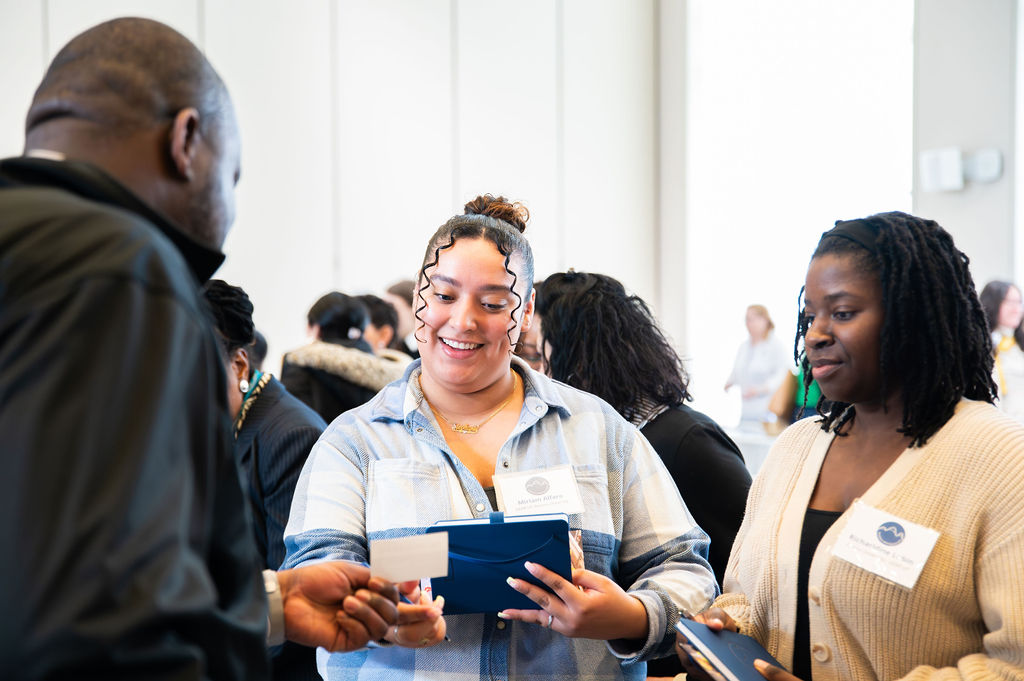Research & Insights / Collaborating to Create Conditions for Students to Graduate College, Career, and Life-ready
Collaborating to Create Conditions for Students to Graduate College, Career, and Life‑ready

On March 20th, New Skills Boston hosted the second annual Seamless Advising Summit. This convening brings together over 250 student support professionals from Boston Public Schools (BPS), Bunker Hill Community College (BHCC), and UMass Boston (UMB) to build a shared understanding of college & career resources, best practices and advising approaches across institutions. It represents New Skills Boston’s collective commitment to creating a seamless advising experience for Boston students.
What is seamless advising?
In 2022, New Skills Boston partners came together to better understand student transitions from secondary to postsecondary and to collectively address the institutional barriers that can make these transitions challenging for students.
Through a working group focused on postsecondary transitions, partners mapped out advising practices in grades 7-16. The process provided a visual of the student experience moving through and across BPS, BHCC, and UMB, highlighting areas of synergy and areas to deepen understanding.
Common among New Skills Boston partners is their commitment to student-centered, equity-minded advising practices that integrate academic and career guidance. However, it became clear that stronger connections between institutional practices could improve student transitions.
Together, New Skills Boston partners defined seamless advising as an approach to student advising whereby K-12, higher education institutions, and partner organizations work together to create the conditions for students to graduate college, career, and life-ready.
New Skills Boston identified the following as essential for fostering a seamless advising experience for students
- Collaborative training opportunities;
- Cohesive and simplified policies;
- Streamlined communications; and
- Purposeful data and information sharing.
Why host a summit?
A key theory of change for New Skills Boston is that a shared understanding among advisors of cross-institution advising practices, resources available to students, and expectations of students will foster improved coordination and support, enabling more seamless transitions.
The idea of a summit, bringing together advisors and student support professionals across BPS, BHCC, and UMB, along with community-based organizations, emerged as a unique opportunity to activate this theory of change, develop shared learning, and offer collaboration space.
The morning opened with a keynote from Dr. Liya Escalera, Lecturer on Education at Harvard University Graduate School of Education. Her address called upon practitioners to lead with equity-minded practices that center students and elevate their cultural wealth. The keynote was followed by a student panel highlighting the various transition points in a young person’s secondary, postsecondary, and career journey and the value of supportive, authentic relationships in facilitating these transitions.
The day progressed with a resource fair of 30+ organizations where Summit participants engaged in one-on-one conversations about job opportunities, higher education programming, and other student support and resources.
Afterward, participants attended workshop sessions where topics ranged from applying principles of cultural wealth to supporting students to advising in the middle grades to leveraging state data systems. The sessions featured and highlighted the knowledge and expertise of Boston’s education community and also provided a unique forum for learning across roles and institutions.
Building community among practitioners was a major goal and accomplishment of the Summit. This was made possible by the strong, cross-sector partnerships developed through New Skills Boston and the shared belief that we can eliminate barriers by working together. Two participants said it best:
We have some great systems in place to support transitions, but we still have more work to do to streamline and make it flexible for all populations.
Seamless looks different for everyone, but it is possible.
The work to advance seamless advising continues, and the next summit is already on the horizon. In the coming year, we will work with our partners and stakeholders to develop relevant, actionable content and engage even more partners in creating seamless advising experiences for Boston students.
You can access more details about the summit and materials shared here and learn more about New Skills Boston here.





